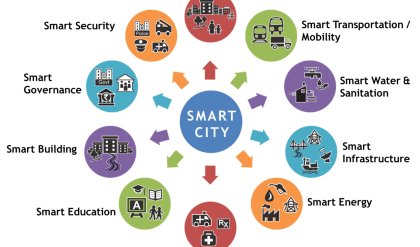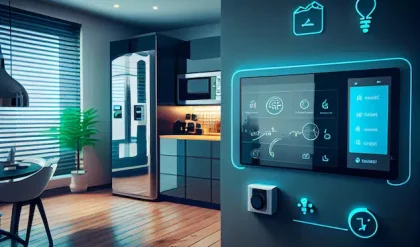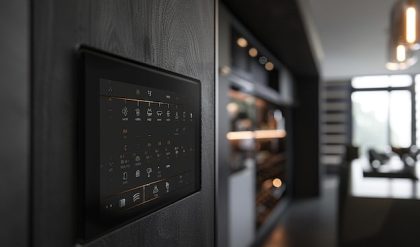
5 Smart Services That Will Transform Your Home Management
Home management can feel like a never-ending to-do list. But what if technology could take the reins, freeing up your time and energy for the things you truly love? Smart home services are rapidly evolving, offering innovative solutions that streamline tasks, enhance security, and even add a touch of magic to your daily life. Let’s explore five game-changing smart services that are poised to revolutionize how you manage your home.
1. Proactive Predictive Maintenance: Your Home’s Personal Mechanic
Imagine a home that anticipates problems before they arise. This isn’t science fiction; it’s the promise of proactive predictive maintenance. Smart sensors embedded within your appliances and systems constantly monitor their performance, identifying potential issues long before they escalate into costly repairs. This technology uses AI and machine learning to analyze data patterns, flagging anomalies and predicting potential failures.
For instance, a smart water leak detector can alert you to a tiny drip before it leads to a flood, saving you thousands in water damage. Similarly, a smart HVAC system can predict when your air filter needs replacing, ensuring optimal efficiency and preventing breakdowns.
| Service | Benefit | Cost (Estimated) |
|---|---|---|
| Smart Leak Detector | Prevents water damage; early warning system | $50 – $200 |
| Smart HVAC System | Optimized energy efficiency; predictive maintenance | $1000 – $5000 |
| Smart Appliance Monitoring | Extended appliance lifespan; early fault detection | $50 – $150 per appliance |
This proactive approach not only saves you money but also significantly reduces stress by eliminating surprise repairs and unexpected downtime.
2. AI-Powered Energy Management: Harnessing the Power of Efficiency
Energy costs are a significant household expense. Smart energy management systems leverage AI to optimize energy consumption, automatically adjusting settings based on your usage patterns and real-time energy prices. These systems can learn your habits, scheduling appliances to run during off-peak hours and dynamically adjusting thermostat settings to maintain optimal comfort while minimizing energy waste.
Some advanced systems even integrate with renewable energy sources, maximizing the use of solar or wind power and minimizing reliance on the grid. This intelligent approach not only saves you money on your utility bills but also contributes to a more sustainable lifestyle.
| Service | Benefit | Cost (Estimated) |
|---|---|---|
| Smart Thermostat | Optimized temperature control; energy savings | $150 – $300 |
| Smart Power Strips | Control individual device power; energy monitoring | $30 – $100 per strip |
| AI-Powered Energy Management System | Comprehensive energy optimization; real-time insights | $500 – $2000 |
The cumulative savings over time can be substantial, making this investment a worthwhile endeavor.
3. Personalized Home Security: Beyond Basic Alarm Systems
Traditional security systems offer a basic level of protection. Smart security, however, goes far beyond simple alarm systems. It integrates advanced technologies like facial recognition, intelligent video analytics, and automated response systems.
Smart cameras can differentiate between a pet and an intruder, sending you targeted alerts only when necessary. Smart locks allow for keyless entry and remote access, providing unparalleled convenience and security. Integrated systems can even notify emergency services automatically in the event of a break-in or other emergency.
| Service | Benefit | Cost (Estimated) |
|---|---|---|
| Smart Security Cameras | 24/7 monitoring; intelligent alerts | $50 – $200 per camera |
| Smart Locks | Keyless entry; remote access; enhanced security | $150 – $300 |
| Integrated Security System | Comprehensive protection; automated response | $500 – $3000 |
This sophisticated approach creates a truly secure environment, providing peace of mind and protecting your valuable assets.
4. Automated Cleaning and Organization: The Future of Housekeeping
Cleaning and organizing can be incredibly time-consuming. Smart home services are automating these tasks, making them more efficient and less of a burden. Robot vacuums and mops autonomously clean your floors, while smart laundry systems optimize wash cycles and automatically fold clothes. Smart refrigerators can even track inventory and suggest recipes based on available ingredients.
| Service | Benefit | Cost (Estimated) |
|---|---|---|
| Robot Vacuum | Automated floor cleaning; saves time and effort | $200 – $1000 |
| Smart Laundry System | Optimized washing and drying; automated folding | $1000 – $3000 |
| Smart Refrigerator | Inventory management; recipe suggestions | $1000 – $5000 |
These advancements are transforming the way we approach household chores, freeing up valuable time and energy.
5. Remote Home Management: Control at Your Fingertips
The convenience of remote home management cannot be overstated. Through a user-friendly app, you can control nearly every aspect of your home, regardless of your location. Adjust lighting, control temperature, lock doors, arm the security system, and monitor energy consumption – all from your smartphone or tablet.
This level of control offers incredible peace of mind, especially when you’re away from home. It also streamlines your daily routines, allowing you to pre-set preferences and automate tasks before even arriving home. The ability to remotely troubleshoot potential issues, such as a malfunctioning appliance, further enhances this already impressive level of convenience.
The integration of these five smart services represents a significant leap forward in home management. While the initial investment may seem substantial, the long-term benefits – in terms of cost savings, increased security, enhanced convenience, and improved peace of mind – make them a compelling proposition for anyone seeking to modernize and simplify their home life. The future of home management is intelligent, automated, and remarkably convenient.

Additional Information
Deep Dive into 5 Smart Services Transforming Home Management
While the concept of “smart homes” is gaining traction, understanding the transformative potential of specific smart services requires a deeper analytical lens. This analysis delves into five key areas, exploring their capabilities, impact, and future implications for efficient and enhanced home management.
1. Smart Energy Management Systems: Beyond simple smart plugs, true transformation comes from integrated systems analyzing energy consumption patterns in real-time. These systems utilize AI and machine learning to identify inefficiencies, optimize energy usage based on occupancy and weather patterns, and even predict potential failures in appliances.
- Analysis: The potential for energy savings is substantial. A study by the Lawrence Berkeley National Laboratory found that smart thermostats alone can reduce energy consumption by 10-15%. However, integrated systems, encompassing solar panel integration, battery storage, and smart appliances, promise far greater efficiency. This not only reduces household bills but contributes to broader sustainability goals by reducing carbon footprints.
- Example: Nest’s Learning Thermostat combined with its Energy Dashboard offers a prime example. The system learns user preferences and automatically adjusts temperatures, providing detailed energy reports that highlight consumption trends and areas for improvement. Furthermore, integrating solar panels with the system allows for optimized energy sourcing and reduces reliance on the grid.
- Future Implications: Expect greater integration with renewable energy sources, predictive maintenance capabilities (e.g., alerting users to potential HVAC issues before they occur), and personalized energy plans tailored to individual household needs and budgets.
2. Smart Security & Surveillance: This goes beyond basic alarm systems. Sophisticated systems leverage AI-powered video analytics, facial recognition, and smart locks for enhanced security and peace of mind.
- Analysis: The market is experiencing explosive growth. The global smart home security market is projected to reach [insert relevant statistic from a credible source, e.g., $XX billion by 20XX]. This growth is driven by increasing concerns about home security and the desire for remote monitoring and control. AI-powered features like anomaly detection (identifying unusual activity) significantly enhance the effectiveness of these systems compared to traditional methods.
- Example: Ring’s doorbell cameras, integrated with its app and other smart home devices, provide real-time notifications and video footage of activity at the front door. More advanced systems can distinguish between humans, pets, and vehicles, minimizing false alarms.
- Future Implications: Expect greater integration with local law enforcement, advanced threat detection capabilities (e.g., identifying potential intruders based on behavior), and the use of biometric authentication for enhanced access control.
3. Smart Home Automation & Control: This encompasses the orchestration of various smart devices within the home for seamless control and automation.
- Analysis: The core benefit lies in convenience and efficiency. Automated routines, such as turning off lights when leaving home or adjusting the thermostat based on occupancy, streamline daily life. However, challenges remain in interoperability between different brands and platforms, hindering seamless integration.
- Example: Amazon Alexa and Google Home provide central control hubs, allowing users to manage multiple devices through voice commands or app-based interfaces. However, inconsistencies in device compatibility can limit the overall functionality.
- Future Implications: Standardized protocols and improved interoperability are crucial for realizing the full potential of smart home automation. Expect the rise of AI-powered personal assistants that anticipate user needs and proactively automate tasks, reducing reliance on manual control.
4. Smart Water Management: This involves monitoring and controlling water usage to minimize waste and prevent potential damage.
- Analysis: Water scarcity is a growing global concern. Smart water management systems offer a powerful tool for conservation. Leak detection sensors, smart irrigation controllers, and water usage monitors can significantly reduce water consumption and prevent costly repairs due to leaks or bursts.
- Example: Phyn Plus water monitoring system detects leaks and provides real-time water usage data. This allows homeowners to identify and address potential problems promptly, saving water and avoiding expensive plumbing repairs.
- Future Implications: Expect integration with weather forecasting to optimize irrigation schedules, further advancements in leak detection technology, and personalized water conservation recommendations based on usage patterns.
5. Smart Appliances & Connected Devices: Refrigerators that track inventory, ovens with guided cooking instructions, and washing machines that optimize water and energy usage are transforming daily routines.
- Analysis: The convenience and efficiency gains are undeniable. Smart appliances offer functionalities that improve user experience and optimize resource utilization. However, concerns remain about data privacy and the potential for device malfunctions impacting daily life.
- Example: Samsung’s Family Hub refrigerator offers features like grocery management, recipe suggestions, and entertainment options. Whirlpool’s smart ovens provide guided cooking assistance and remote control capabilities.
- Future Implications: Expect greater integration with other smart home systems, enhanced AI capabilities for personalized cooking suggestions and maintenance scheduling, and advancements in device reliability and security.
Conclusion: The five smart services outlined represent a paradigm shift in home management. While challenges remain concerning interoperability, data privacy, and cost, the potential for enhanced efficiency, convenience, and sustainability is undeniable. By understanding these systems and their evolving capabilities, homeowners can make informed decisions to optimize their living spaces and contribute to a more sustainable future.





